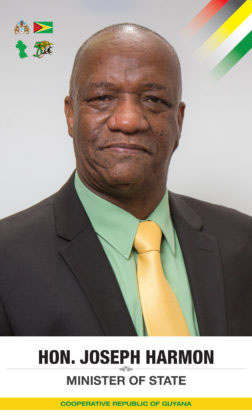Government has decided that there will be a Commission of Inquiry (CoI) into the deaths of hundreds of persons during the unprecedented six-year crime wave here from 2002 and the members of the commission will be named this week, Minister of State Joseph Harmon yesterday said.
“Before the end of the week,” Harmon said when asked following the commissioning of four bridges at Alexander Village, Georgetown.
While he did not give a definitive make-up of the commission, Harmon informed that it would comprise as many as three persons and a judge would definitely be among the members.
President David Granger last week signaled that a COI was being mulled when he addressed members of the Guyana Defence Force (GDF,) at the opening ceremony of the Annual Officers’ Conference at Base Camp Ayanganna. He said that his administration will ensure that the perpetrators are brought to justice.
“Society has been scarred by violence, which left a lingering legacy of distrust with the potential of fresh disorder. Monuments at Bartica, Buxton and Eve Leary have been erected to the victims of violence during the ‘troubles’ between 2002 and 2009. We still have an obligation to investigate those troubles and ensure that the culprits are brought to justice,” he said, while noting that there were 1,431 murders in that period.
Following the February 23rd, 2002 Camp Street prison jailbreak, there was an unprecedented crime wave, with armed robberies and murders, including hits on police, reaching unprecedented levels across the country. Some kidnappings and high-profile murders were fueled in part by narco-trafficking and disputes between rival organisations, while then former President Bharrat Jagdeo’s government was accused of supporting the activities of a vigilante “phantom” death squad. That squad was believed to have been led by convicted drug trafficker Roger Khan who claimed that he helped the Jagdeo government in its crime fight against targeted criminals. Three massacres, at Lusignan, Bartica and Lindo Creek in 2008, also occurred during this period.
Harmon said that Granger always felt that there should be closure for the families of those killed and had, even as the then Leader of the Opposition, brought a motion to Parliament asking that there be a CoI. “At some point in time, you have to bring closure to some things and I believe that is what the President is saying. We have to bring closure. Under the laws of Guyana, any crime where there is an unnatural death, the law requires that an inquest is held under the Coroner’s Inquest Act…Now he is president, he is in a position to do something about it. I want to assure you he will do something about it. When the president says something he means it,” Harmon stressed while noting that getting information is not an issue.
“There are still people who are out there who were never called upon to give a statement. Families who are there, who just heard that something happened… Something has to be done about it. We have to bring closure to these wounds and I think this is what the president is suggesting,” he added.
Jagdeo, under whose Presidency the killings began, told a news conference on Saturday that he would be willing to testify if a CoI was set up.
“If there is something that we know specifically of, definitely,” Jagdeo said.
He noted that the current government “keeps pulling out the hat this thing about ‘the troubled period,’” adding that President Granger has been speaking of an inquiry of this nature for some time and had previously indicated his intention to establish a CoI which he (Jagdeo) has consistently dared him to do.
“It has been almost three years and I dared him to do it and I suggested in the past that I would like to work with him on the Terms of Reference [ToRs] because we should look at the political operatives who were working with the drug dealers…,” Jagdeo said, while pointing out that the sitting government ministers who were accused of collaborating with criminals during that period should be placed under the microscope.
“So, I would love to have a Commission of Inquiry into the troubled period and why not extend it a little bit more to the past and bring it up to the future too. We can have a big CoI,” he said, before adding that in addition to good ToRs there should be credible commissioners. “Then you will see how politically-inspired many of the killings were in that period… that they got political support, the criminals. That’s the difference today,” he said, while noting that the PPP/C has an unambiguous position on crime.
Harmon was asked yesterday how his government intended to safeguard against the possibility of the CoI being politicised moreso with local government elections this year and the 2020 General and Regional Elections.
He said that the issue was a serious one that needed to be frontally dealt with from an apolitical vantage point and it is what government will ensure.
“I don’t know about safeguards. This is about fact-finding, this is about issues of fact and for the CoI to determine what happened, when it happened, who was involved and therefore what actions needs to be taken,” Harmon posited.










